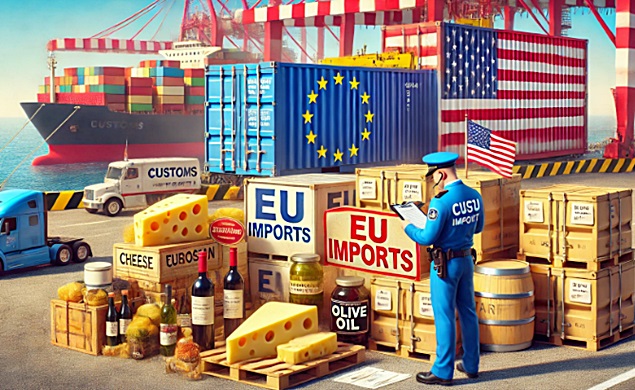1337

EU Agri-Food Sector Faces Potential Disruptions Amid Proposed U.S. Import Tariffs, PoultryWorld Reports
Significant Consequences Expected
A recent RaboResearch report highlights that proposed U.S. import tariffs could have far-reaching consequences for the European agri-food sector, particularly impacting agricultural machinery and processed food products.
Given the EU’s substantial trade surplus with the United States, several areas within the agricultural and food industries may feel the effects—affecting farmers, food processors, and equipment manufacturers alike.
The proposed tariffs may lead to higher costs for EU products on the U.S. market, potentially altering market access and competitive dynamics for European agri-food exports. Furthermore, the tariffs could reshape not only EU–U.S. trade flows but also broader global trade patterns.
Shifting EU–U.S. Agricultural Trade Dynamics
While the EU is largely self-sufficient in agricultural goods and exports modest surpluses globally (with a significant share going to the U.S.), it remains heavily reliant on imports of soybeans and soy products, primarily sourced from the U.S. and Brazil.
In 2024, the EU exported €38 billion worth of food and agricultural products to the U.S., while importing only €14 billion, creating a notable trade surplus.
According to RaboResearch, this surplus is driven by exports of high-value products such as essential oils, wine, olive oil, and dairy, while U.S. exports to the EU consist mainly of lower-value commodities.
“The U.S. market is far more important to EU food and agricultural companies than the EU market is for American firms,” stated Barend Bekamp, Senior Agri-Food Analyst at RaboResearch. “From the EU’s perspective, the U.S. serves primarily as a vital export market, while for the U.S., the EU is more significant as a supplier than a buyer.”
Industries Most at Risk
Sectors most vulnerable to U.S. tariffs are those heavily reliant on the American market and particularly sensitive to price fluctuations. According to RaboResearch, the agricultural machinery sector is likely to face the most severe impact.
With tight margins, U.S. farmers may favor domestic machinery over tariff-burdened imports from the EU.
Consumer processed foods—including dairy, beverages, and pasta—may face a moderate impact, depending on price elasticity in those sectors. Meanwhile, sectors such as animal protein, fertilizers, and sugar, where the U.S. is not a major export destination, are expected to experience minimal disruption. Products with low price elasticity may absorb tariff costs through price increases.
How Can EU Companies Respond?
According to Bekamp, EU companies have several strategic options to mitigate the impact of potential tariffs:
- Maintain current pricing and pass additional costs on to U.S. importers
- Lower prices to remain competitive
- Exit the U.S. market altogether
- Redesign supply chains to bypass tariffs
- Invest in U.S.-based production
“The best course of action,” Bekamp noted, “depends largely on a company’s international footprint and the price sensitivity of its products.”
“Tariffs threaten not only the trade relationship between the EU and the U.S.,” he added, “but also risk triggering retaliatory actions from Canada, Mexico, and Brazil—who also face U.S. trade measures. This could give rise to a complex web of regional and sector-specific interactions, significantly reshaping global trade dynamics.”





